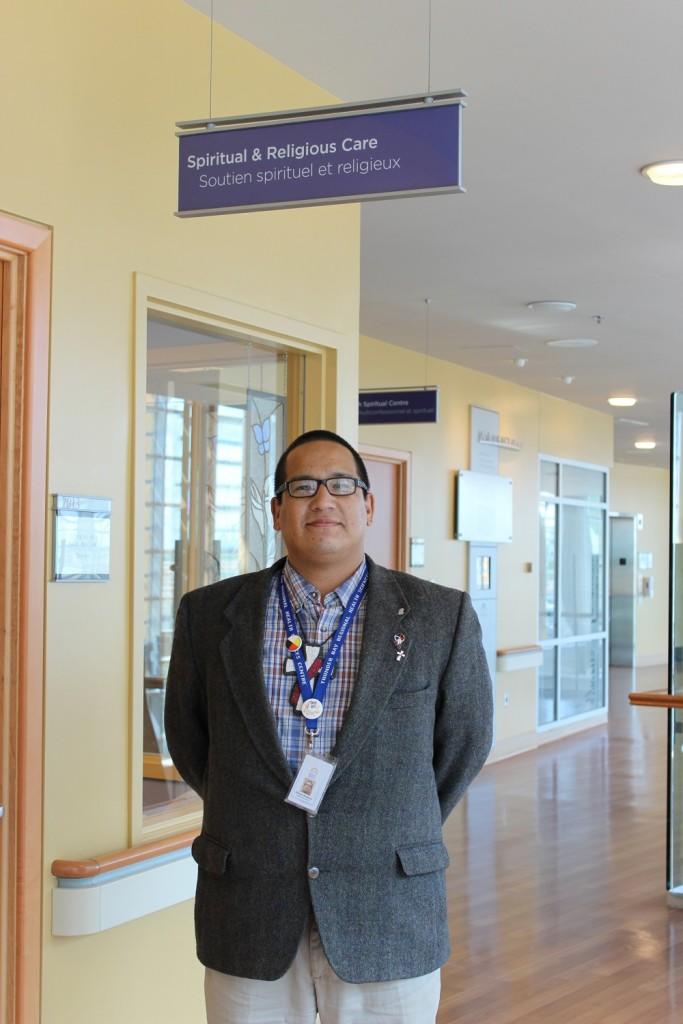Patients and Families Now Have Access to Aboriginal Spiritual Care
by Donna Jeanpierre
 Michael Robinson is one of TBRHSC’s Spiritual Care Providers, whose role is to provide spiritual services, guidance or connections to local spiritual and religious services of the patient’s preference. Although he helps people of any faith, as well as those of no faith, his primary focus is on supporting Aboriginal patients at TBRHSC.
Michael Robinson is one of TBRHSC’s Spiritual Care Providers, whose role is to provide spiritual services, guidance or connections to local spiritual and religious services of the patient’s preference. Although he helps people of any faith, as well as those of no faith, his primary focus is on supporting Aboriginal patients at TBRHSC.Since the age of 7 Michael Robinson knew that he wanted to be involved in spiritual care. “It’s always been my dream to help people in this way.”
Now, bringing with him over 20 years of experience, Robinson is providing spiritual care services for patients and families at Thunder Bay Regional Health Sciences Centre (TBRHSC).
As a Spiritual Care Provider, his role is to provide spiritual services, guidance or connections to local spiritual and religious services of the patient’s preference. Although he helps people of any faith, as well as those of no faith, his primary focus is on supporting Aboriginal patients at TBRHSC.
Before Robinson was hired, patients requesting traditional Aboriginal spiritual support relied on resources outside the hospital which took time to arrange and often their needs went unmet.
Trina Diner, Manager, Palliative Care and Telemedicine, says the hospital is very fortunate to have found Robinson. “About half of our referrals to Spiritual Care are Aboriginal patients and families seeking support. Therefore we purposefully tried to recruit someone with an Aboriginal specialty to respond to their needs. He does smudging several times a week in our Spiritual Care Centre.”
Previously, Robinson volunteered at the hospital for several years through his church and provided pipe and smudging ceremonies on a regular basis.
The ceremonies he provides are also open to Aboriginal patients. Sometimes more than half the people in attendance are not Aboriginal.
Patients who practice Aboriginal spirituality often give Tobacco offerings or even food offerings to Robinson that need to be “placed” in the bushes appropriately. “I often visit the little creek that is on the north side of the hospital to place offerings and offer the appropriate prayers. I usually do this as soon as it is practical, and usually without too much delay, because it is an important aspect of Aboriginal spirituality.”
Robinson has received a number of spiritual high honours, including the title of Eagle Staff Carrier, which is a designation assigned by family and elders in the family. From a non- Aboriginal perspective, the Staff is the equivalent to the Canadian flag.
Set to be ordained as a deacon in September, Robinson sees a lot of similarities between Catholicism and Aboriginal spirituality. “Ignatius of Loyola [the main creator of the Society of Jesus, a religious organization of the Catholic Church whose members were known as Jesuits] taught that God exists in all things. Similarly, Aboriginal spirituality teaches that the Creator created all things. Therefore he touched everything, so everything is sacred.”
Spiritual Care support is available with two full-time Spiritual Care Providers: Robinson and Lisa Laitinen-Egbuchulam. Patients or their family members may request spiritual care support for a number of reasons, such as after a diagnosis or prior to surgical procedures; when treatment options are being considered; if the patient or family are asking meaning of life questions; or at the time of a death.
“I want people to know this department is available in the hospital,” says Robinson. “I want people to see Spiritual Care Providers as part of the team.”